
Blasts from the past
Whether you find them delightful or annoying, slang words have been with us for centuries. The confusing thing is that they change often. At one time you spilled the beans, but now you spill the tea. You used to have a big head, but now you flex. You might use some words so often that you don’t even think about them anymore. That’s why the quirky origins of your favorite slang words might surprise you. But today, let’s take it old school. What about the origins of these vintage slang phrases from the past?
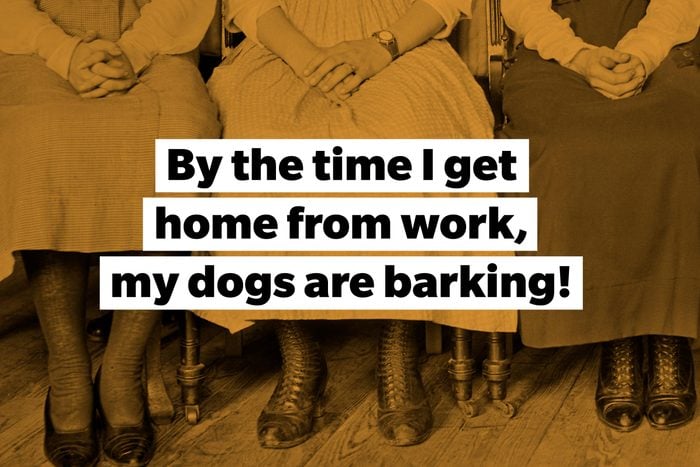
My dogs are barking
This old-school complaint about aching toes originated when “dogs” was used to refer to feet. The Free Dictionary.com claims this slang phrase began in Great Britain, though according to the A Way with Words podcast, this term was an American invention, credited to cartoonist Thomas “Tad” Dorgan. Incidentally, Dorgan is also credited with coining the term “hot dog” as in your favorite ballpark treat. As for those barking dogs, they demand attention—and so do your overworked tootsies. We wish these 22 overplayed slang words from 2019 would retire.
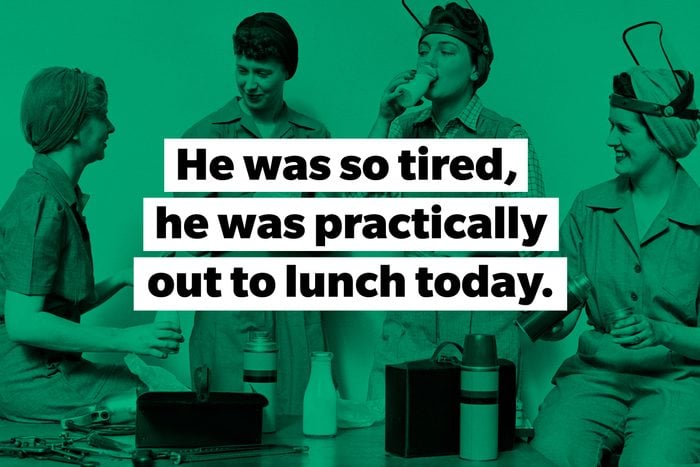
Out to lunch
Have you ever tried talking to someone standing right next to you, only to realize they’ve totally checked out of the conversation? If so, you’ve been with someone who is “out to lunch.” Idioms Online says this slang term can mean anything from “inattentive” to “crazy or insane.” It’s been used since the mid-1940s. Find out the slang words no one from outside your state will understand.
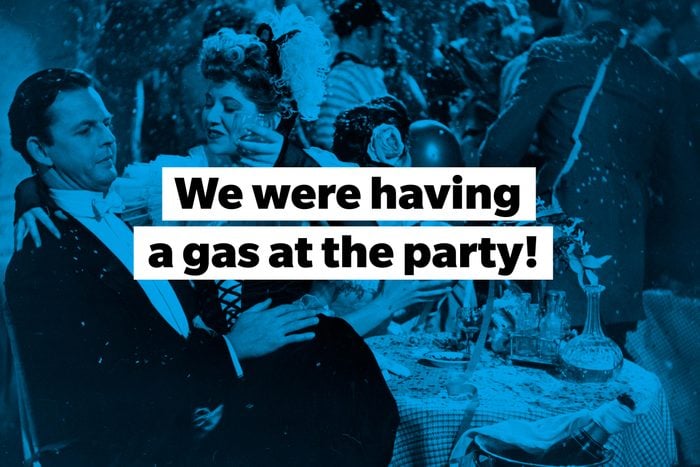
Having a gas
It’s January 1, and your friends want to know what you did for New Year’s Eve. Was it spectacular? Were there fireworks? Did you have a gas? If you haven’t guessed the meaning by now, here’s the definition: “having a gas” means having a great time, maybe even obnoxiously so. Thefreedictionary.com doesn’t give a specific origin date for this old-school slang, but it’s safe to say it was used during most of the 20th century. These 20 slang words need to end ASAP.
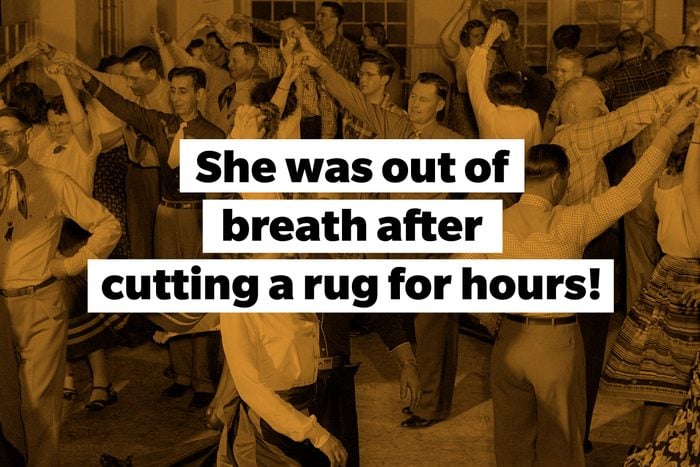
Cut a rug
Even Merriam-Webster.com isn’t quite certain when this delightfully descriptive phrase first came into play. It’s easy to imagine what it means though—dancing with great energy, speed, and panache, so much so that you ruin the flooring. Perhaps your grandma learned to cut a rug before her wedding reception in the town’s old dance hall. Find out the brand new words added to the dictionary in 2019.
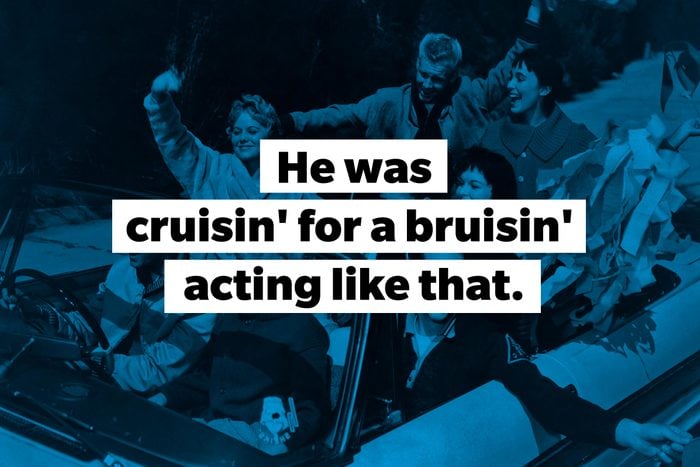
Cruisin’ for a bruisin’
Back in the 1950s, when teenagers cruised up and down Main Street for Friday night fun, hot summer evenings were ripe with excitement and emotions. Maybe one scalawag stirred one too many pots or poked one too many bears. Whatever he was doing, he was cruisin’ for a bruisin’. In other words, if a fist found his face, he had it coming.

Burning rubber
Have you ever been minding your own business on the highway when a flash of chrome races past your side mirror? If the speedster had to navigate a tight curve or slam on the brakes, a distinct odor filled the air. There’s nothing like the smell of burning rubber. WritingExplained.org describes “burning rubber” simply as “going fast.” The phrase became popular in the 1970s, perhaps since cars were only getting faster and sleeker by that decade. News publication Chron.com once used it like this: “Watch this vehicle hit 110 miles per hour in a quarter-mile in 12.4 seconds, burn rubber, then face off – quite well, as a matter of fact – with a Dodge Hellcat on the dragstrip.”
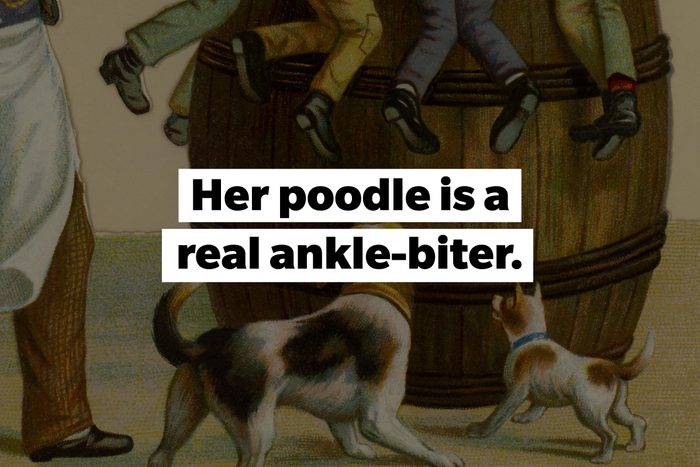
Ankle-biter
You’d be forgiven if you think “ankle-biter” only refers to a tiny dog or rodent. But perhaps the aggressive term’s larger meaning is intentional—it can also mean “a young child,” according to Merriam-Webster.com. The dictionary says this old-school slang term has been used since 1840. The slang for both animals and kids makes sense: small children and tiny dogs do have a few things in common. Both require a lot of attention, have more bark than bite, and wreak far more havoc than their tiny bodies belie. Find out the origins of 14 common idioms that you use all the time.
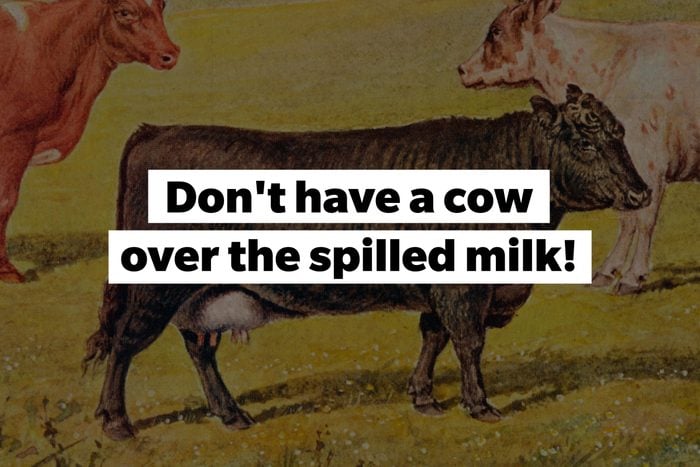
Have a cow
Grammarist.com points out that “having a cow” and “having kittens” are virtually the same in the world of old-school slang. While North Americans say “Don’t have a cow!” when someone seems overly angry or agitated, people in England say, “Don’t have kittens!” So what’s with the animal birth metaphors? Grammarist.com says both phrases surfaced in the early 1900s. The specific origin of these phrases is elusive, but it’s possible to see the parallel between giving birth and feeling a bit worked up. It is called labor, after all! You should also know the 10 things you should never say to a pregnant woman.

Scrub
Twenty-one years ago, American girl group TLC released a song called, “No Scrubs” on their latest cassette tape album. The trio crooned, “I don’t want no scrub / A scrub is a guy that can’t get no love from me,” and the lyrics have stuck. But what exactly is a scrub? And where did the TLC ladies dig up this term in the first place? OnlineSlangDictionary.com describes a scrub as “a man with no class.” Perhaps the insult is simply a clever twist on the traditional definition of “scrub”: a small, stunted tree. A man who is stunted and insignificant could indeed come across as penniless, small-minded, or even classless.
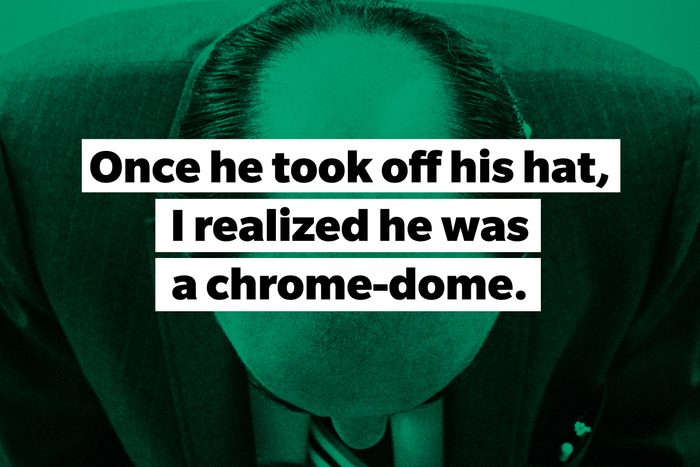
Chrome-dome
Dictionary.com offers up two distinct definitions for this slang phrase: “a bald-headed person” or “an intellectual.” These days, calling someone a “chrome-dome” isn’t usually a compliment. It’s an insult with a side of imagery. The term first surfaced in the name of a 1960s United States Air Force mission: Operation Chrome Dome. According to Air & Space, B-52 bombers—which had “bald,” shiny tops, as many jets do—rotated between flying routes over the Mediterranean and Arctic. Language often evolves with time, and this picture-perfect phrase took a much lighter turn after the Cold War. For a list of new slang words across the nation, read these slang words we loved in 2019.

The royal shaft
Not every slang term’s origin is easily found—when it comes to dictionary inclusion, some of them get the royal shaft. So what exactly is the royal shaft? The New Partridge Dictionary of Slang and Unconventional English says it is “monumental mistreatment.” Snubbed by your ex-best friend? She gave you the royal shaft. Ignored by the restaurant server for 45 minutes while everyone else gets their food? Yeah, you got the royal shaft. The phrase first surfaced in Mark Howard Medoff’s When You Comin Back, Red Ryder? in 1974. It’s been floated by mistreated patrons in the United States ever since.
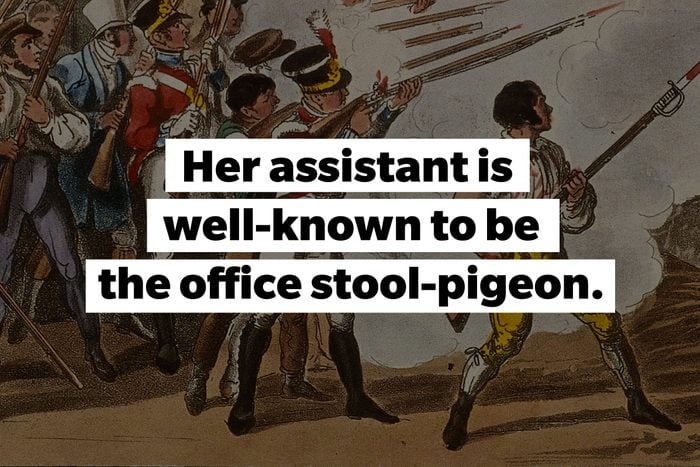
Stool-pigeon
Ever felt like there are spies in your midst? Call them out for the stool-pigeons they are! This old-school slang nickname refers to a spy or secret informer. Merriam-Webster.com says the term was first used in 1826. Like these words and phrases that originated in the military, it seems most suited for battlefront or Cold War conversations. Have a little fun with it at the office by outing the gossipy “stool-pigeons” at the water cooler or that particularly talkative yenta in the next cubicle (yenta—now that’s a word only an English major would know!).
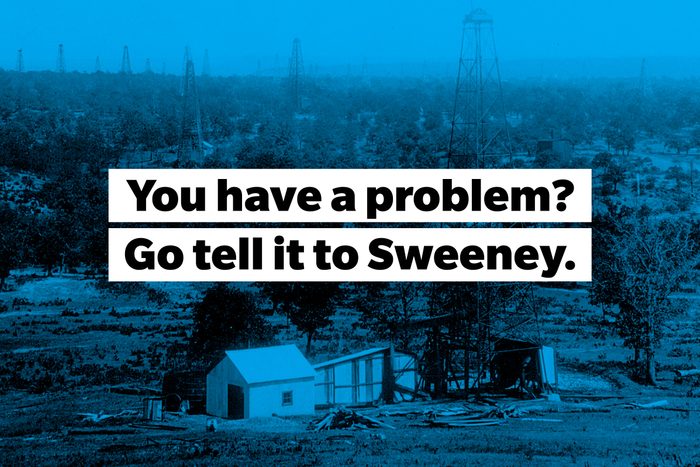
Tell it to Sweeney
This vintage phrase is similar to “talk to the hand.” In 1927, a silent comedy film called Tell it to Sweeney debuted but the phrase dates back even earlier. “An Oklahoma City councilman adapted the phrase for his own use when dealing with certain constituents and on May 19, 1918,” according to Oklahoman.com. At the time, a man named L.L. Sweeney was in charge of the Oklahoma City sewage system. The newfangled system had more than its fair share of backups. The councilman grew tired of telling everyone how to file their complaints, so he shortened his explanation to just one phrase: “Tell it to Sweeney.” If you think that’s odd, check out these strange slang terms from the roaring ’20s.
